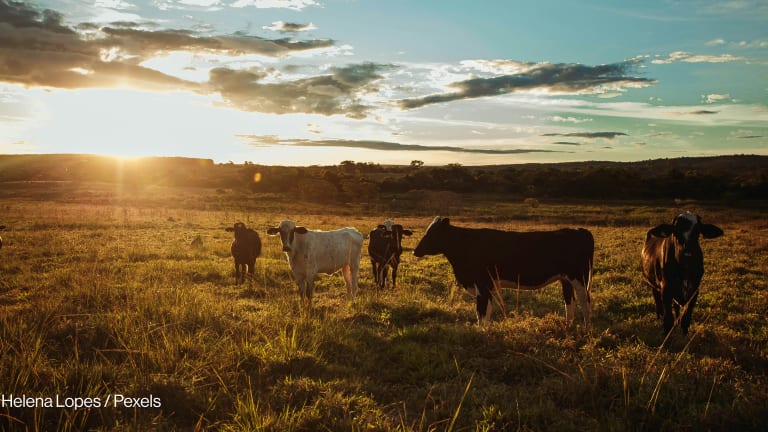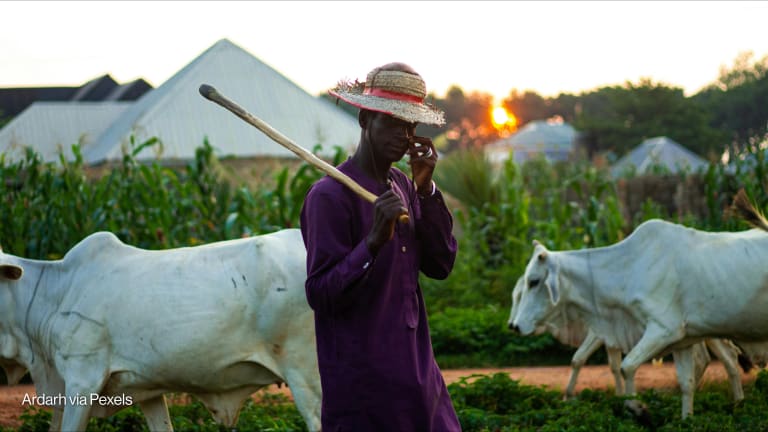Opinion: Reducing food methane pollution without compromising nutrition
Uniting across a diversity of solutions is critical to methane emission reduction in global food systems without compromising access to nutritious foods.
From devastating floods to debilitating droughts, in 2023 the world witnessed an unprecedented increase in extreme weather and record heat. Methane emissions, with 80 times more warming potential than carbon dioxide, are projected to cause significant temperature increases in the next two decades. Approximately 60% of annual anthropogenic methane emissions originate from the global food system — particularly livestock, food loss and waste, and rice cultivation. The urgent nutrition crisis is likewise apparent. The Food and Agriculture Organization reports over 3.1 billion people globally cannot afford a nutritious diet, 30% of the world population experiences moderate or severe food insecurity, and diet-related chronic disease prevalence increasingly skyrockets. Accelerating food-system produced methane reduction, while critical, must recognize and accommodate the complex health, particularly nutrition, implications such solutions will deliver. For example, meat and dairy are vital sources of essential nutrients and play a critical role in the livelihoods and economies of diverse communities. Rice is a staple food for more than 3.5 billion people — many of them living in poverty and otherwise undernourished. Fruits and vegetables — cornerstones of a healthy diet — are the most lost or wasted food commodity and are regularly inaccessible for many. Any climate change mitigation solution in food systems, including methane emissions, must consider the implications on nutrition and health, particularly for the world’s most vulnerable people. It’s encouraging to see momentum shifting toward tangible action to reduce methane pollution. In 2021, over 150 countries signed the Global Methane Pledge at the 26th U.N. Climate Change Conference of the Parties ,or COP 26, to decrease methane emissions by 30% by 2030. In 2023, COP 28 elevated the climate conversation around food and agriculture, including the urgency of methane mitigation, with new efforts announced to scale up research and cost-effective solutions across agriculture and food loss and waste. Yet, several gaps remain in the global efforts to curb methane emissions — and here are four steps to tackle the issue. 1. Focus on the private sector Except for the Dairy Methane Action Alliance, aimed at accelerating industry action and accountability on methane across the dairy sector, the private sector remains on the fringes. Industry groups in livestock, rice cultivation, and food loss and waste maintain the technology, capital, and scale to accelerate change. Greater effort to mobilize and unite private sector stakeholders is required to reduce methane while ensuring access to affordable nutritious food. 2. Methane reduction solutions warrant context-based approaches Across the global north and south, meat and dairy comprise vital sources of bioavailable, essential nutrients. Yet, numerous scientific reports identify excess consumption of red and processed meats as a significant dietary risk factor for Type 2 diabetes, cardiovascular disease, and cancer. The evidence suggests that where consumption of meat is in excess and methane emissions are greatest, reduction in consumption can represent a win-win for climate change mitigation and diet-related disease reduction. In contrast, for many global south communities, healthy diets, including animal proteins, remain unavailable and unaffordable. Productivity per cattle head is also generally less. In such contexts, better herd management to increase productivity of animals, rather than increased herd size, could increase availability and affordability of vital nutrients for combating malnutrition while simultaneously reducing emissions in already low-emitting regions — offering another win-win solution. Unfortunately, global dialogues continue to focus on one-size-fits-all solutions, when in reality, multiple pathways must be taken to achieve a sustainable and equitable global food future. 3. Compensate farmers Trade-offs for producers are often overlooked to the detriment of their livelihoods, prosperity, and food security. In Asia, where rice cultivation is a large contributor to methane emissions, mitigation innovations such as dry-wet alternating irrigation, direct seeding, and perennial cropping can reduce emissions, but may be costly, and limit farmer acceptance. Farmers should be compensated when they adopt low-emission practices. As a food systems community, myopic concern for one issue must be replaced by conscientious weighing and considering the externalities that different solutions present. This must include public-private partnerships to ensure methane reduction tools are accessible by all farmers. 4. Invest in measurement and monitoring A paucity of published information exists regarding the impact of methane mitigation activities on nutrition — demanding an increased investment in measurement and monitoring. For example, to our knowledge, no tools exist to support the decision-making required to determine who should pay incremental costs until price parity is achieved for mitigation innovations. This will be critical to ensuring an affordable price for nutritious foods, particularly for low-income consumers. Ultimately, climate-smart solutions can and must deliver returns for nutrition — but we need actionable data and monitoring tools to help decision-makers weigh the trade-offs of different solutions present. Given these existing gaps, uniting all stakeholders, including the private sector, across a diversity of solutions is critical to achieving progress toward methane reduction in global food systems without compromising access to nutritious foods for every person, everywhere. Civil society must work together with industry, finance, and policy leaders committed to and capable of reducing methane emissions without compromising access to nutrition at scale. This includes livestock producers and processors, animal feed companies, alternative protein entrepreneurs, rice cultivators, seed companies, and food loss and waste innovators who willingly acknowledge that radical change will only be achieved with their participation. Such efforts must aim to unite diverse stakeholders, build committed leadership, and inspire strategic yet achievable pathways forward for industry and society to deliver on methane reduction and nutrition security goals. The urgency of mobilizing collaborative, collective action for planetary and human health has never been more apparent. Now is the time to unite unlikely bedfellows and transform our food systems for a healthier, more prosperous world.
From devastating floods to debilitating droughts, in 2023 the world witnessed an unprecedented increase in extreme weather and record heat. Methane emissions, with 80 times more warming potential than carbon dioxide, are projected to cause significant temperature increases in the next two decades. Approximately 60% of annual anthropogenic methane emissions originate from the global food system — particularly livestock, food loss and waste, and rice cultivation.
The urgent nutrition crisis is likewise apparent. The Food and Agriculture Organization reports over 3.1 billion people globally cannot afford a nutritious diet, 30% of the world population experiences moderate or severe food insecurity, and diet-related chronic disease prevalence increasingly skyrockets.
Accelerating food-system produced methane reduction, while critical, must recognize and accommodate the complex health, particularly nutrition, implications such solutions will deliver.
This article is free to read - just register or sign in
Access news, newsletters, events and more.
Join usSign inPrinting articles to share with others is a breach of our terms and conditions and copyright policy. Please use the sharing options on the left side of the article. Devex Pro members may share up to 10 articles per month using the Pro share tool ( ).
The views in this opinion piece do not necessarily reflect Devex's editorial views.
Ertharin Cousin currently serves as the CEO and managing director of Food Systems for the Future, and is a distinguished fellow at the Chicago Council on Global Affairs. She is a Bosch Academy Robert Weizsäcker fellow and a visiting scholar at Stanford University’s Center on Food Security and Environment. Previously, Cousin led the World Food Programme and served as the U.S. ambassador to the United Nations agencies for food and agriculture in Rome.
Shenggen Fan is chair professor and dean of the Academy of Global Food Economics and Policy at China Agricultural University. Prior to joining CAU, he served as director-general of the International Food Policy Research Institute from 2009 to 2019. He holds a Ph.D. in applied economics and an M.Sc. in agricultural economics.









